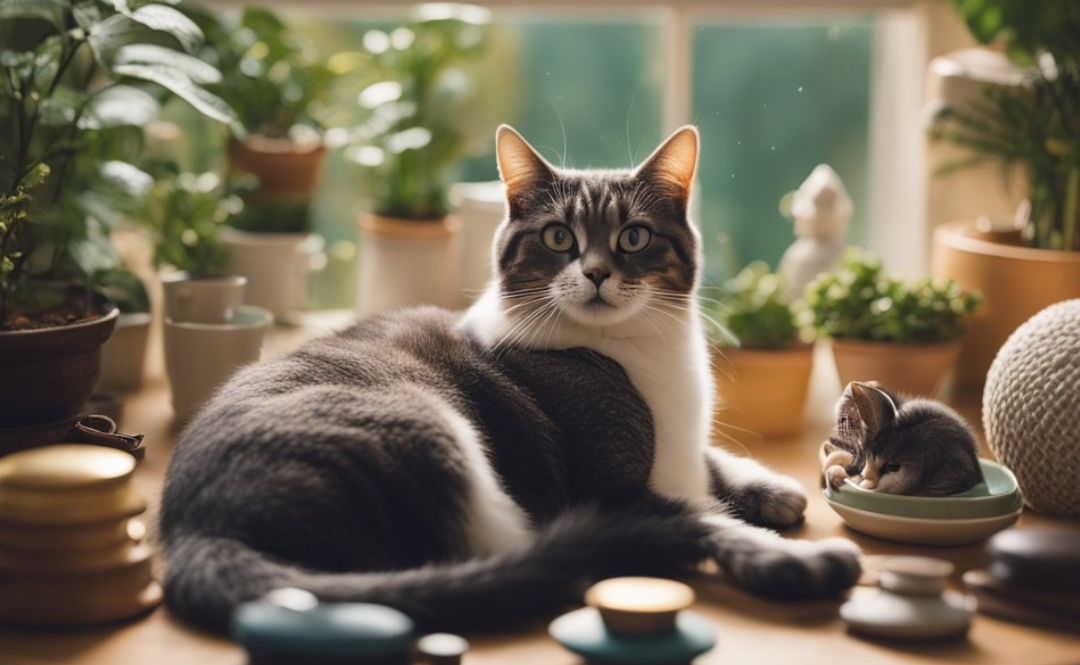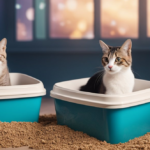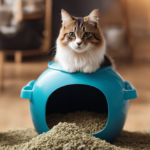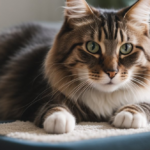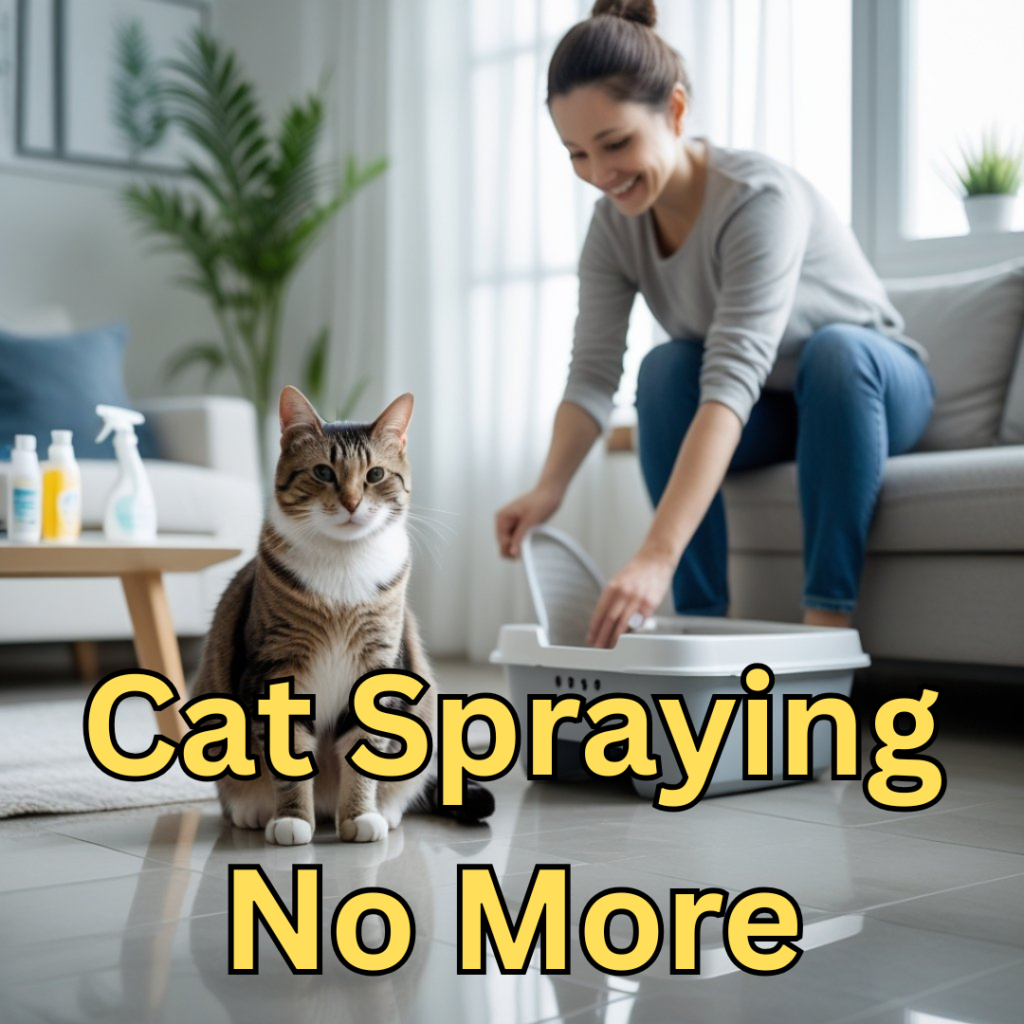Cat Health Essentials are not just about having an emergency vet on speed dial for those midnight hairball horrors; it’s about everyday paw-some practices to keep your whiskered companion purring with pleasure. In this compact guide, we’ll scratch the surface on how to ensure your feline friend remains the cat’s meow of health and happiness. So, curl up in your favorite spot and let’s dive into a litter of tips that will have you feline fine about your cat’s well-being!
As cat owners, we all want our feline friends to be healthy and happy. Keeping our cats healthy requires providing them with proper nutrition, preventive health care, and daily care essentials. In this article, we will cover the cat health essentials that every cat owner should know to keep their furry friend healthy and happy.
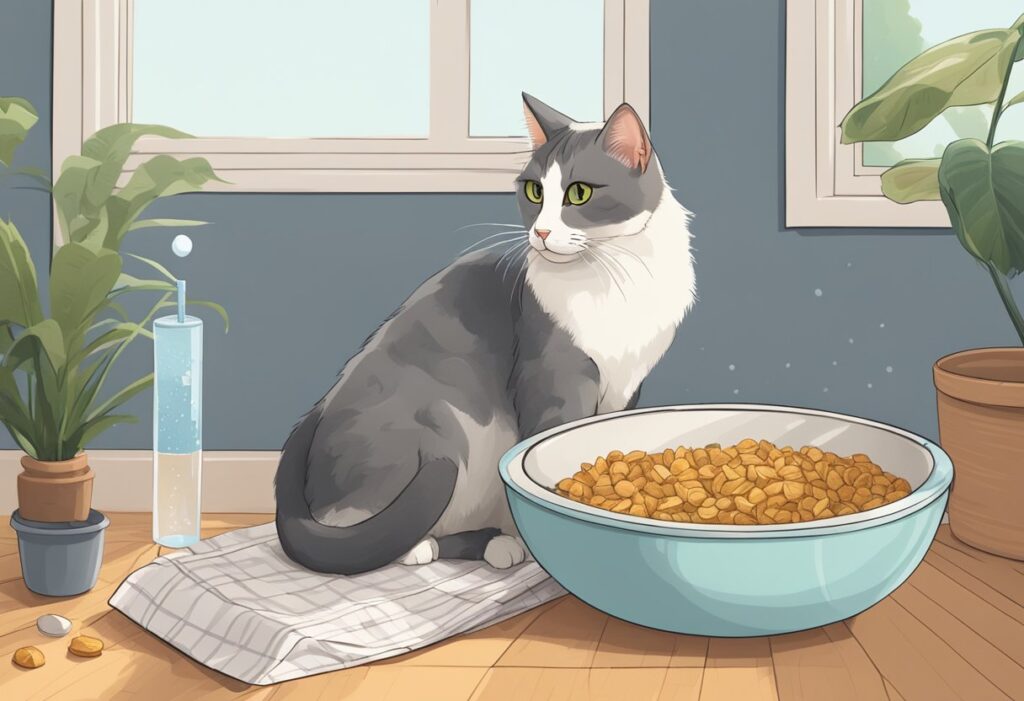
Nutrition and diet play a critical role in maintaining a cat’s health. A balanced diet that meets their nutritional needs is essential for their overall health, growth, and development. Preventive health care is also crucial for cats. Regular check-ups with a veterinarian, vaccinations, and parasite control are necessary to keep our cats healthy and prevent the spread of diseases.
Daily cat care essentials, such as grooming, providing fresh water, and litter box maintenance, are also crucial for maintaining a cat’s health and happiness. In addition, creating a safe and stimulating environment for our cats can help prevent behavioral issues and promote their well-being. Finally, recognizing the signs of illness and aging in cats is essential to provide them with the care they need.
Key Takeaways
- Proper nutrition and preventive health care are essential for maintaining a cat’s health.
- Daily cat care essentials, such as grooming and providing fresh water, are crucial for their well-being.
- Recognizing the signs of illness and aging in cats is essential to provide them with the care they need.
Cat Health Essentials
| Product Short Name | Rating | Price |
|---|---|---|
| Zymox Otic Enzymatic Solution | 4.7 | $23.79 |
| Purina Pro Plan Veterinary Supplements FortiFlora | 4.7 | $28.25 |
| Nutramax Cosequin 80 Sprinkle Capsules | 4.7 | $19.99 |
| Elanco Tapeworm Dewormer | 4.6 | $15.98 |
| Fresh Step Advanced Clumping Cat Litter | 4.6 | $32.39 |
| Comfort Zone Multi Cat Calming Diffuser Refills | 4.6 | $51.00 |
| FELIWAY MultiCat Calming Pheromone, 30 Day Refill | 4.4 | See Price |
| Nutramax Cosequin Joint Health Supplement | 4.4 | $12.48 |
| Capstar (nitenpyram) for Cats | 4.4 | $37.98 |
| FELIWAY Classic Cat Calming Pheromone, 30 Day Refill | 4.5 | $17.99 |
| Pet Honesty Cat Hairball Support Chews | 4.5 | $11.99 |
| FRONTLINE Plus Flea and Tick Treatment | 4.3 | $40.98 |
| Oxyfresh Premium Pet Dental Care Solution | 4.3 | $17.95 |
| HICC PET Teeth Cleaning Wipes | 4.3 | $15.99 |
| Vet’s Best Dental Care Finger Wipes | 4.3 | $11.63 |
| CHARLIE & BUDDY Hеmp Оil for Dogs Cats | 4.3 | $21.99 |
| FELIWAY MultiCat Calming Pheromone Diffuser | 3.9 | $23.12 |
| FELIWAY Classic Cat Calming Pheromone Diffuser | 4.0 | $23.40 |
| FELIWAY Optimum Cat, Enhanced Calming Pheromone Diffuser | 4.0 | $29.99 |
| FELIWAY Classic Cat Calming Pheromone Spray | 4.0 | $22.95 |
| VETRISCIENCE Perio Support Dental Powder | 4.2 | $20.91 |
*Prices are as listed without Subscribe & Save discounts or additional coupons. Some products do not have a price listed and may require visiting the retailer for the current price. Amazon Affiliate Link.
Nutrition and Diet
As responsible pet owners, we want to ensure that our cats receive proper nutrition to maintain their health. In this section, we will discuss the essential components of a healthy feline diet, including feeding your cat, understanding cat food labels, and age-appropriate diets.
Feeding Your Cat
When it comes to feeding your cat, it’s essential to remember that cats are obligate carnivores. This means that they require a diet rich in animal-based protein to meet their nutritional needs. As such, it’s important to choose a high-quality cat food that provides all the necessary nutrients your cat needs to thrive.
Cats can be fed either dry food, canned food, or a combination of both. While dry food is convenient and affordable, canned food provides more moisture, which can be beneficial for cats with kidney disease or diabetes. It’s also important to note that cats require a high amount of taurine in their diet, which is found naturally in animal-based protein.
Understanding Cat Food Labels
When selecting cat food, it’s important to read and understand the labels. Look for foods that meet the Association of American Feed Control Officials (AAFCO) standards for complete and balanced nutrition. Additionally, check the ingredient list to ensure that animal-based protein is listed as the first ingredient.
Avoid foods that contain fillers, by-products, or artificial preservatives. These ingredients provide little nutritional value and can be harmful to your cat’s health in the long run.
Age-Appropriate Diets
As cats age, their nutritional needs change. Kittens require a diet that is high in protein and fat to support their growth and development. Adult cats require a balanced diet that provides all the necessary nutrients to maintain their health. Senior cats may require a diet that is lower in calories and fat to prevent obesity and other age-related health issues.
In conclusion, proper nutrition is essential for maintaining your cat’s health. By feeding your cat a high-quality cat food that meets their nutritional needs, understanding cat food labels, and providing an age-appropriate diet, you can help ensure that your cat lives a long, healthy life.
Preventive Health Care
As responsible cat owners, we want to ensure that our feline friends live long and healthy lives. One of the best ways to achieve this is through preventive health care. Here are some essential preventive health care measures that we should take to keep our cats healthy.
Regular Veterinary Checkups
Regular visits to the veterinarian are crucial for maintaining our cat’s health. According to the AAHA-AVMA Feline Preventive Healthcare Guidelines, cats should have a veterinary examination at least annually. However, for older cats or those with underlying health issues, more frequent visits may be necessary. During these visits, the veterinarian will perform a thorough physical exam, check for any signs of illness, and discuss any concerns we may have about our cat’s health.
Vaccinations and Parasite Control
Vaccinations are an essential part of preventive health care for cats. Vaccines protect our cats from serious and potentially life-threatening diseases such as feline leukemia, rabies, and distemper. Additionally, we should also take steps to control parasites such as fleas and ticks. Fleas and ticks can carry diseases and cause discomfort for our cats. We can prevent flea and tick infestations by using flea and tick preventatives recommended by our veterinarian.
Spaying and Neutering
Spaying and neutering our cats can help prevent certain health problems. For instance, spaying a female cat before her first heat cycle can reduce her risk of developing breast cancer and uterine infections. Neutering a male cat can help prevent testicular cancer and reduce his risk of developing prostate problems. Additionally, spaying and neutering can help reduce the number of homeless cats in our communities.
In conclusion, preventive health care is essential for maintaining our cat’s health and well-being. By taking these simple steps, we can help ensure that our feline friends live long, happy, and healthy lives.
Daily Cat Care Essentials
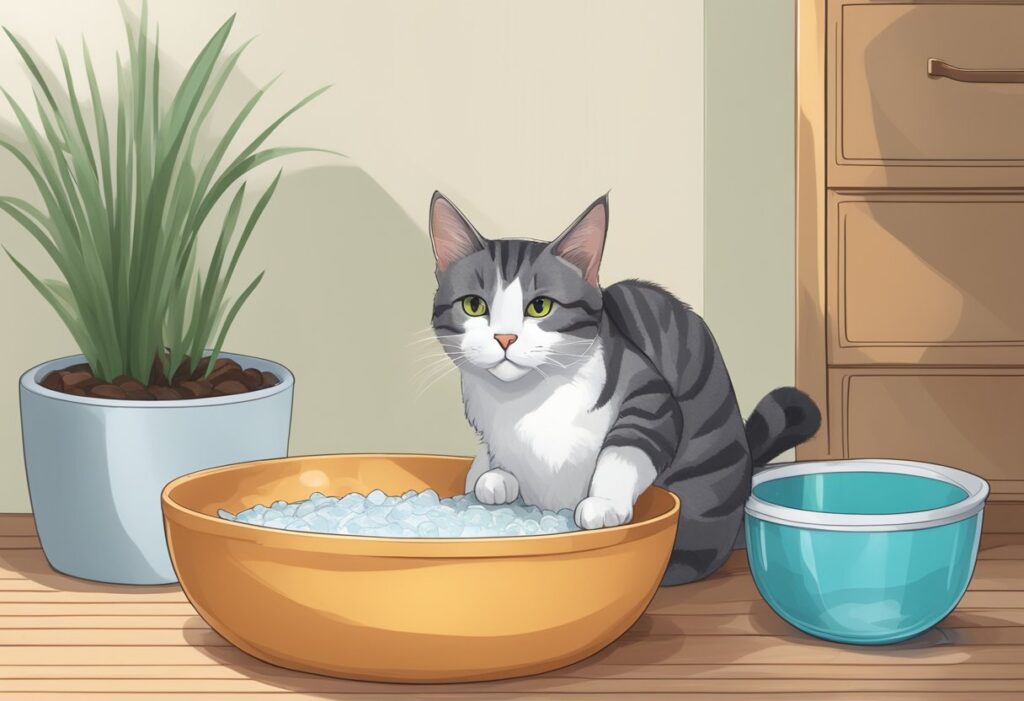
As responsible cat owners, we must ensure that our feline friends are healthy and happy. Daily cat care essentials include hydration and feeding stations, litter box maintenance, grooming, and nail clipping.
Hydration and Feeding Stations
Proper hydration is essential for a cat’s overall health and well-being. We must provide fresh, clean water at all times and wash and refill our cat’s water bowls daily. Stainless steel bowls are the best option as they are easy to clean and do not harbor bacteria. Automatic food and water servers are also a great option for busy cat owners.
When it comes to feeding, we should choose a balanced food that is appropriate for our cat’s life stage. Foods that contain taurine, an essential amino acid, are important for heart and eye health. It is also important to provide regular meals and not free feed our cats to prevent obesity.
Litter Box Maintenance
Regular litter box maintenance is crucial for a cat’s health and hygiene. We should provide a clean litter box with appropriate litter for our cat’s needs. Clumping litter is a popular option as it is easy to scoop and helps control odor. We should scoop the litter box at least once a day and completely change the litter and clean the box once a week.
Grooming and Nail Clipping
Grooming helps keep our cats clean and healthy. Regular grooming can prevent hairballs, matting, and shedding. We should brush our cats at least once a week, and more often for long-haired cats. Nail clipping is also important to prevent our cats from scratching furniture or injuring themselves. We should use a proper nail clipper and be careful not to cut the quick.
By following these daily cat care essentials, we can ensure that our feline friends live happy and healthy lives.
Behavior and Environment
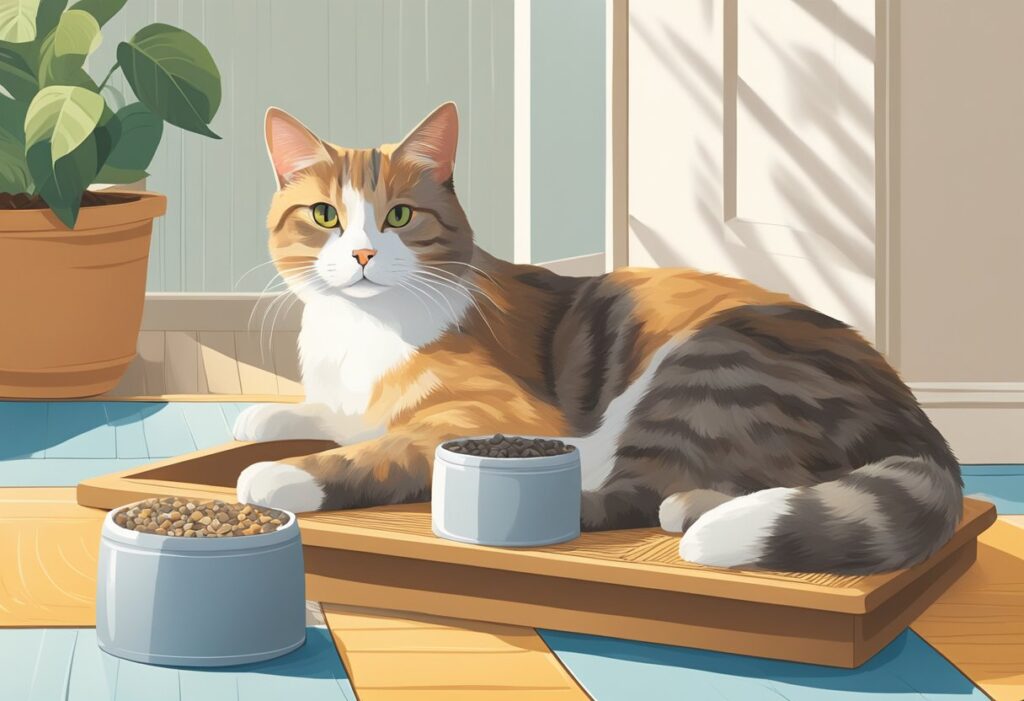
As cat owners, we know that cats are unique creatures that require specific care and attention. One of the most important aspects of cat care is understanding their behavior and providing an environment that suits their needs. In this section, we will discuss the key components of creating a healthy and happy environment for your feline friend.
Providing Entertainment
Cats are natural hunters and require mental stimulation to stay healthy and happy. Providing toys and interactive playtime can help keep your cat mentally stimulated. Toys such as scratching posts, cat toys, and climbing posts can provide an outlet for your cat’s natural instincts. Interactive play can also help strengthen the bond between you and your cat.
Creating Safe Spaces
Indoor cats need a safe space where they can retreat and feel protected. Creating a safe space can be as simple as providing a window perch or a cozy kitty house. For cats that are easily stressed, providing a cat carrier as a safe space can be beneficial. It is important to note that cats are territorial animals and may need multiple safe spaces throughout the home.
Understanding Cat Behavior
Understanding your cat’s behavior is essential to providing a healthy environment. Scratching is a natural behavior for cats and providing scratching posts can help prevent damage to furniture. It is also important to provide mental stimulation and enrichment to prevent boredom and destructive behavior. Cat furniture, such as climbing posts and scratching posts, can provide a safe outlet for your cat’s natural instincts.
In conclusion, providing a healthy environment for your cat is essential to their overall health and wellbeing. Understanding their behavior and providing mental stimulation and enrichment can help prevent boredom and destructive behavior. By providing safe spaces and entertainment, you can create a happy and healthy home for your feline friend.
Signs of Illness and Aging
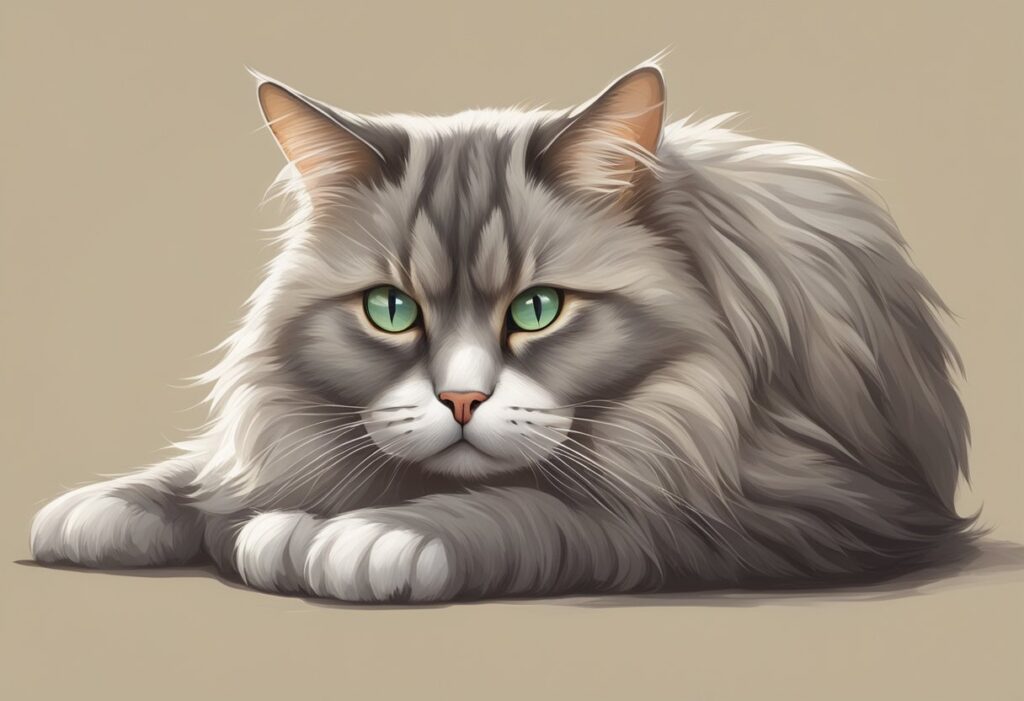
As responsible cat owners, it is important to recognize the signs of illness and aging in our feline friends. Early detection of health issues can lead to more successful treatment and a better quality of life for our pets. In this section, we will discuss common health issues and how to care for senior cats.
Recognizing Common Health Issues
Cats can suffer from a variety of health issues, including hairballs, vomiting, diarrhea, and infectious diseases. It is important to monitor your cat’s behavior and take note of any changes. If your cat is lethargic, not eating or drinking, or showing signs of distress, it is important to seek veterinary care immediately.
Age is also a factor in cat health. As cats age, they may experience joint pain, dental issues, and other health problems. It is important to provide a comfortable and safe environment for your senior cat, including a warm and cozy cat bed.
Caring for a Senior Cat
Cats over 11 years of age are officially in their senior years. As cats age, they require special care and attention. Regular veterinary check-ups are important to monitor your cat’s health and catch any issues early.
Proper dental care is also important for senior cats. Use cat-safe toothpaste and provide your cat with dental treats or toys to help keep their teeth healthy.
Identification is also important for senior cats. Make sure your cat has a collar with identification tags or is microchipped in case they wander away from home.
In conclusion, recognizing the signs of illness and aging in our cats is crucial for their overall health and well-being. By monitoring our cats’ behavior and providing proper care, we can ensure a happy and healthy life for our feline friends.

